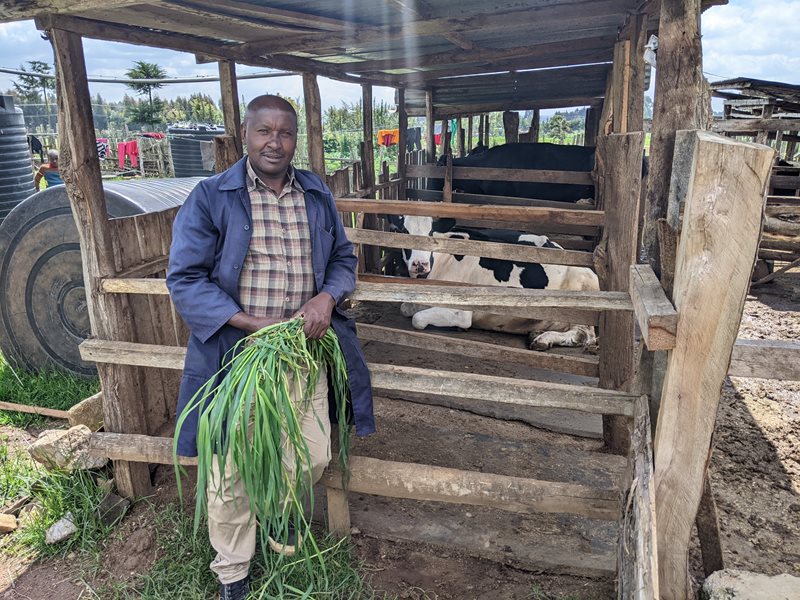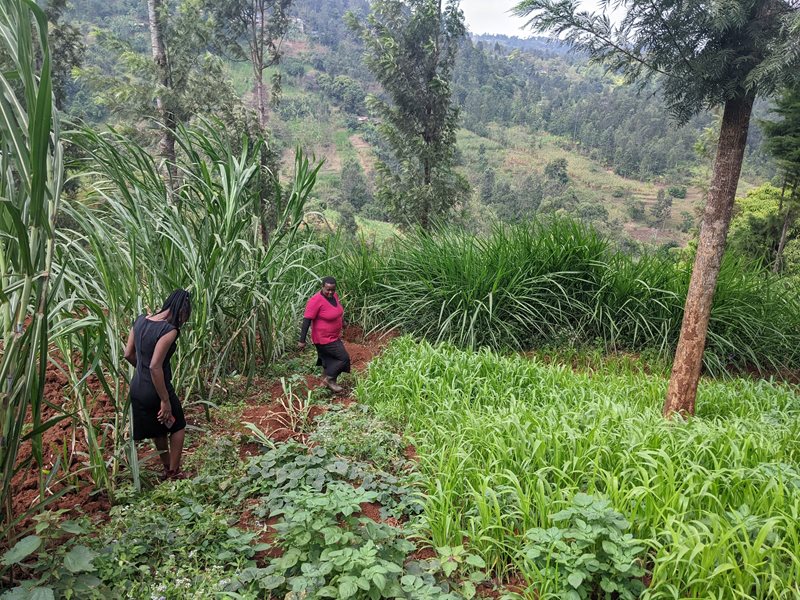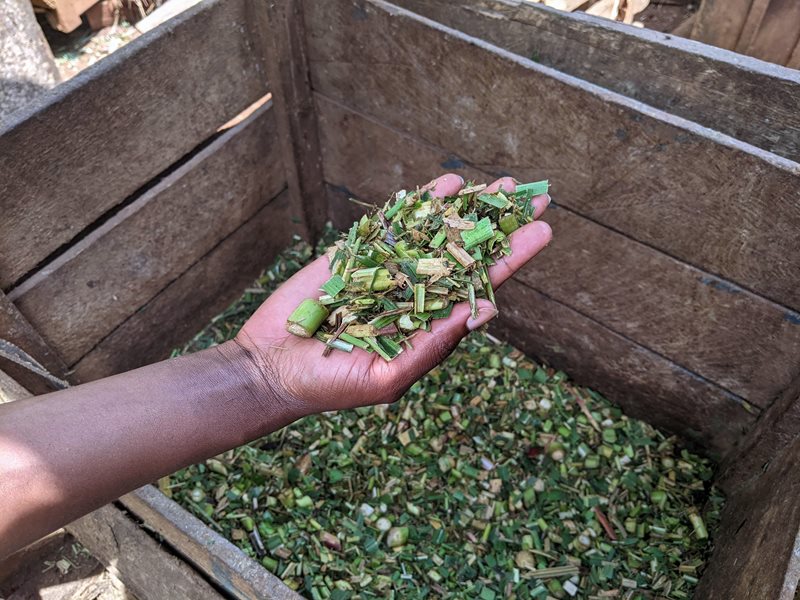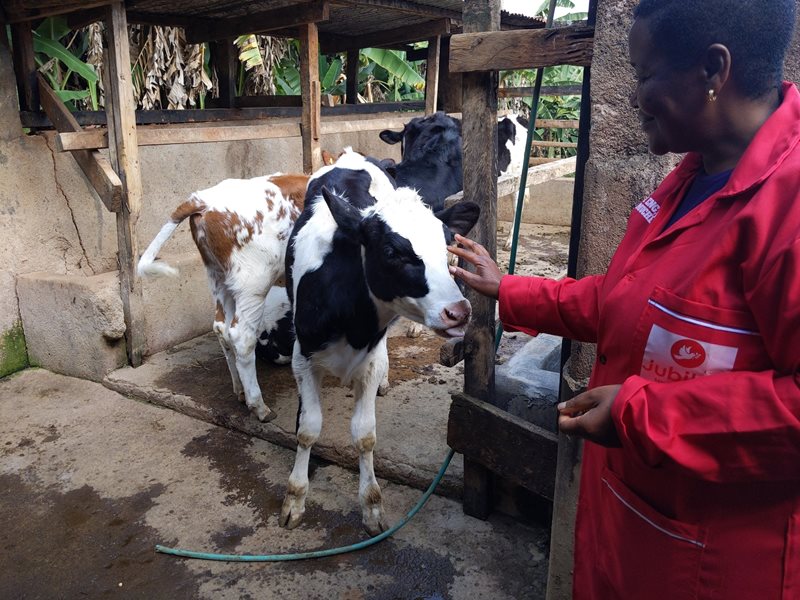Two dairy farms in Kenya offer a glimpse into how farmer access to technical extension and outreach services through the Wakulima dairy cooperative and the Dairy Nourishes Africa program have improved their livelihoods and strengthened local dairy markets.
Banner photo: Entrance to the Wakulima Dairy factory in Mukurweini county, Kenya.
Kenyan dairy cooperative Mukurweini Wakulima Dairy Ltd. (“Wakulima”) began in November 1990, with farmers from around Nyeri County gathering under a tree to discuss how to obtain fairer prices for their milk. Just over 30 years later, the original cohort has grown from 35 farmers contributing less than a liter of milk per person into a nationally distributed farmer-owned business with over 9,800 shareholders supplying 65,000 liters of milk daily.
The dairy sector in Kenya employs over two million households and provides a critical source of nutrition for the population. Yet, dairy productivity remains low, due in large part to a lack of access by producers to improved breed genetics, high quality fodder, and technical knowledge of animal health and nutrition. Under these constraints, how did Wakulima manage to grow from its humble origins into the success story it is today?
As a farmer cooperative, Wakulima understands the importance of their producers’ wellbeing to the quality of the final product. To that end, it operates a vertically integrated business model that provides everything its members need to sustainably improve milk production — from technical extension services to animal feed, veterinary services, and financing suitable for small- to medium-sized farms. Cooperative membership has, in turn, resulted in fairer and more reliable income, improved access to services, and greater profits/decreased costs for smallholder dairy farmers.

Farmers were able to save farm costs by growing improved forage.
Technical Extension
Since 2020, Wakulima has partnered with Dairy Nourishes Africa (DNA) to support its extension activities in dairy husbandry. DNA is an initiative implemented by Venture37 and Bain & Company, with funding from Global Dairy Platform and CoBank. The project provides training guidance and materials on the establishment and management of forage plots, silage making, improved varieties of forage seed, and optimal feed formulations.
DNA trainings are conducted through a model-farmer approach: 33 farms across Mukuwe-ini sub-county serve as demonstration sites for “exchange visits,” where improved techniques and technologies in forage cultivation are showcased to farmers from the surrounding area. Wakulima believes that these farmer-to-farmer exchanges present “a unique feature in the approach of advising, training, and sharing experiences … they speak the language of the farmers.” Extensionist Tabitha Njeri, who is responsible for organizing exchange visits, affirms that “farmers always leave very impressed with what they’ve seen. They’re excited to try it on their own farms.”
One of these demonstration sites — the small farm of the Githiji family — sits on a steep hill with sweeping views. Though beautiful, the limited space and steep pitch of the landscape poses certain challenges for sustainable crop and soil management. According to Ms. Njeri, most smallholder farmers in Kenya have one half to two acres of land. “The land probably cannot all be dedicated to forage,” she says of small-scale farms, “so it’s important to remain flexible and work with what each farm has,” to allocate between food and forage crops. Under Ms. Njeri’s guidance, the Githiji family planted a combination of forage maize and sorghum appropriate for the location. Napier grass, another hardy forage, surrounds the perimeter of the plots to retain soil on the terraced hillside and bulk up the feed for their cows.

The Githiji family farm sits on a steep hill, so they plant Super Napier, a hardy forage, along its borders.
The Mutahi family farm — a large-scale farm with 48 cows that produces 300 to 400 liters of milk a day — serves as another DNA demonstration site. Similarly to the Githiji farm, this site showcases several different forage crops and new seed varieties provided by DNA partner, Advanta Seeds. The differences between each farm, such as the amount of land available, type of soil, and other contextual factors, offer unique opportunities for learning from both a farmer and a programmatic perspective. Based on the germination success of the project-provided sorghum seeds, the Mutahi farm made plans to expand the field from one-half to two and one-half acres. Wakulima extension agents can take this into account when advising farms with similar conditions on the suitability of different forage species.
Dairy Feed and Forages
DNA’s focus on animal nutrition recognizes that high quality, locally available forage is the most immediate and cost-effective way of improving dairy production. At the same time, dairy meal and supplements can be used to optimize animal nutrition. Dairy meal is a concentrated feed blend specially formulated to give the right balance of nutrients, making it one of the most cost-intensive aspects of dairy farming. To ensure the quality and affordability of dairy meal for its members, Bora Feeds was conceptualized by Wakulima as an adjacent business. Today, Bora Feeds processes 20 tons of raw materials per day and manufactures seven different formulations of animal feeds that are sold to members and non-members alike.
To find the right balance of nutrition and cost, the Githiji family receives technical guidance on feed formulations. Feeding plans are created according to a cow’s life stage and dairy cycle, each as individual as the names of the Githiji’s four animals: Queenie, Force One, Monica, and Delta. With personalized counseling, their cows have become highly productive considering the farm’s small size — producing up to 27 liters per cow a day, compared to 7 to 9 liters for the average Kenyan smallholder farmer. “We were able to use the income from the extra milk to pay for our children’s school fees,” adds Mrs. Githiji.

Farmers cut forage into small pieces for easier digestion by cows, or to create long-lasting silage.
Proper forage preservation and storage is important for large and small farms alike, though the Mutahi family has a much larger herd to feed, and thus more forage to process. From the entrance to their farm, one notices the sour-sweet smell of silage wafting from a large storage bunker. Silage is made through a process of fermentation, which preserves nutritional quality and reduces spoilage. As part of the training program, DNA facilitates access to fodder choppers to efficiently process and store fresh forage at its nutritional peak. As access to mechanization is limited in Kenya, Mrs. Mutahi attests that “the choppers have been a game-changer for the farmers.”
Veterinary Services
Wakulima’s support program also includes access to veterinary and breeding services. In Kenya, only certified veterinary technicians are allowed to buy livestock medicine and genetic material. Where providers are spread thin, many smallholder farmers have difficulty receiving the services necessary to maintain and improve animal health and productivity. To address this issue, Wakulima employs five of its own veterinary personnel who conduct an average of 400 artificial inseminations per month, provide veterinary drugs, and extend animal health support at no service cost to its members. With the help of Wakulima veterinarians, the Mutahi farm maintains the health of its herd, including five champion cows (producing 25 to 30 liters per day), the eldest of which is still providing milk at an incredible 12 years old.

Mrs. Ann Mutahi, pictured, uses Wakulima veterinarians to breed her family's cows with quality genetic material.
Credit Stores and Financing
Finally, Wakulima operates several credit stores that are stocked with everything a dairy farm may need, such as animal feeds, forage choppers, milk cans, boots, and even household consumables like food staples and soap. Although the stores are open to the public, Wakulima members gain the benefit of making purchases on credit as part of its savings and credit cooperative (SACCO) program. Both the Mutahi and Githiji farms have taken advantage of this program to buy feed or other supplies based on the amount of milk they have supplied that month before payday. The SACCO also offers advance payments, loans, and livestock insurance through Wakulima partner Heritage Insurance. During periods of drought or personal hardships, these options serve to smooth fluctuations in family income and expenses and ease unpredictable financial burdens.
Since its beginnings under the tree in 1990, MWDL has advanced alongside its growing membership to offer a comprehensive farmer support program. Farms of varying size and stage of productivity benefit from access to skills and services in dairy management, animal health and nutrition, and farm finance. Under the technical guidance and expertise of Dairy Nourishes Africa, the cooperative has hit upon a successful formula to sustainably intensify dairy production to the benefit of both its farmers and consumers. Moreover, it serves as a replicable model for transforming the dairy sector in Kenya and beyond.